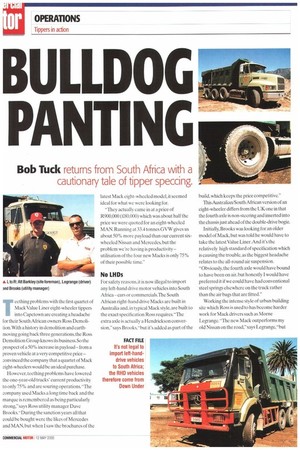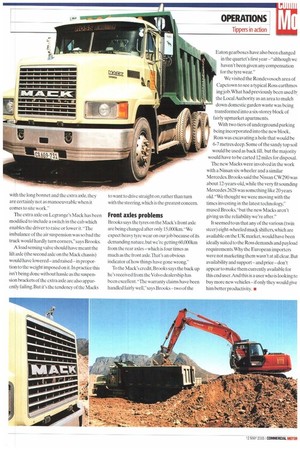1111; 11 . 1)0G P AN TING
Page 52

Page 53

If you've noticed an error in this article please click here to report it so we can fix it.
Bob Tuck returns from South Africa with a cautionary tale of tipper speccing.
eething problems with the first quartet of Mack Value Liner eight-wheeler tippers into Capetown are creating a headache for their SouthAfrican owners Ross Demolilion. With a history in demolition and earthmoving going back three generations, the Ross Demolition Group knows its business. So the prospect of a 50% increase in payload— from a proven vehicle at a very competitive price — convinced the company that a quartet of Mack eight-wheelers would be an ideal purchase.
However, teething problems have lowered the one-year-old trucks' current productivity to only 75% and are souring operations. "The company used Marks a long time back and the marque is remembered as being particularly strong," says Ross utility manager Dave Brooks."During the sanction years all that could be bought were the likes of Mercedes and MAN, but when I saw the brochures of the latest Mack eight-wheeled model, it seemed ideal for what we were looking for.
"They actually came in at a price of R900,000 (£80,000) which was about half the price we were quoted for an eight-wheeled MAN. Running at 33.4 tonnes GVW gives us about 50% more payload than our current sixwheeled Nissan and Mercedes.but the problem we're having is productivity — utilisation of the four new Macks is only 75% of their possible time."
No LHDs
For safety reasons, it is now illegal to import any left-hand drive motor vehicles into South Africa — cars or commercials.The South African right-hand drive Marks are built in Australia and, in typical Mack style, are built to the exact specification Ross requires. "The extra axle is actually a Hendrickson conversion," says Brooks. "but it's added as part of the build, which keeps the price competitive."
This Australian/SouthAfrican version of an eight-wheeler differs from the UK one in that the fourth axle is non-steering and inserted into the chassis just ahead of the double-drive bogie.
Initially, Brooks was looking for an older model of Mack, but was told he would have to take the latest Value Liner-And it's the relatively high standard of specification which is causing the trouble, as the biggest headache relates to the all-round air suspension. "Obviously, the fourth axle would have bound to have been on air, but honestly I would have preferred it if we could have had conventional steel springs elsewhere on the truck rather than the air bags that are fitted."
Working the intense style of urban building site which Ross is used to has become harder work for Mack drivers such as Morne Legrange."The new Mack outperforms my old Nissan on the road," says Legrange,"but with the long bonnet and the extra axle, they are certainly not as manoeuvrable when it comes to site work."
The extra axle on Lcgrange's Mack has been modified to include a switch in the cab which enables the driver to raise or lower it. "The imbalance of the air suspension was so had the truck would hardly turn corners," says Brooks.
A load sensing valve should have meant the lift axle (the second axle on the Mack chassis) would have lowered — and raised — in proportion to the weight imposed on it. In practice this isn't being done without hassle as the suspension brackets of the extra axle are also apparently failing. But it's the tendency of the Macks to want to drive straight on , rather than turn with the steering, which is the greatest concern.
Front axles problems
Brooks says the tyres on the Mack's front axle are being changed after only 15,000km."We expect heavy tyre wear on our job because of its demanding nature, but we're getting 60,000km from the rear axles—which is four times as much as the front axle.That's an obvious indicator of how things have gone wrong."
To the Mack's credit,Brooks says the back up he's received from the Volvo dealership has been excellent. "The warranty claims have been handled fairly well," says Brooks—two of the Eaton gearboxes have also been changed in the quartet's first year--although we haven't been given any compensation for the tyre wear."
We visited the Rondevosoch area of Capetow-n to see a typical Ross earthmo% ing job. What had previously been used b: the Local Authority as an area to mulch down domestic garden waste was being transformed into a six-storey block of fairly upmarket apartments.
With two tiers of underground parking being incorporated into the new block, Ross was excavating a hole that would be 6-7 metres deep. Some of the sandy top soil would be used as back fill. but the majority would have to be carted 12 miles for disposal.
The new Macks were involved in the work with a Nissan six-wheeler and a similar Mercedes. Brooks said the Nissan CW290 was about 12-years-old, while the very fit sounding Mercedes 2628 was something like 20 years old. "We thought we were moving with the times investing in the latest technology," mused Brooks,"but the new Macks aren't giving us the reliability we're after."
It seemed to us that any of the various (twin steer) eight-wheeled muck shifters, which are available on the UK market, would have been ideally suited to the Ross demands and payload requirements. Why the European importers were not marketing them wasn't at all clear. Bul availability and support—and price — don't appear to make them currently available for this end user. And this is a user who is looking to buy more new vehicles — if only they would give him better productivity. •
























































































































































































































